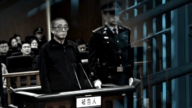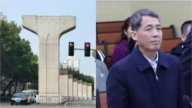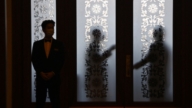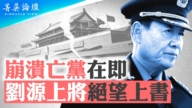【新唐人2013年10月08日訊】大陸作家、知名老右派——鐵流,通過郵局直接寄給中共中央紀律檢查委員會書記王岐山一封舉報信,告發前中共常委李長春受賄千萬元人民幣賣官一事。鐵流披露,在10年前的「中國書協」分會黨組書記與主席的更換過程中,明顯違反程序,北京文化界圈內人都知道是李長春收受賄賂的結果。請看報導。
鐵流在舉報信中寫道,張飆先生於2000年2月從《科技日報社》總編輯位置,調到「中國書法家協會」,出任分黨組書記兼駐會副主席時,不到55歲是書協最年輕的一把手。當時書協又窮又破,無車、無房管理鬆弛、人員淆亂,是任何官員都不願意去的地方。可是在張飆的經營管理下,「書協」很快有新起色:會員劇增,收入過線。
按程式規定:「書協主席」最少任職時間應為兩屆,可以幹到七十歲。可張飆一屆還未到期,年齡未過五十九歲就被河南省書協主席張海取而代之。
據內部知情人告訴,是張海花了八百萬元人民幣,走了常委李長春的後門,再經中宣部長劉雲山出面指壓全國文聯,硬把張飆拿下換上了張海。
鐵流還表示,不久前,他從文化界一位有影響力的遺孀和幾位字畫商那裏也了解到,張海的主席位置是花一千萬元買的。
鐵流相信,他的舉報信肯定會引起很大的反響,這也是對中共總書記習近平提出的「大小老虎一齊打」、「摘去常委免死牌」新政的測試。
中國作家鐵流:「王岐山一定會回,中紀委一定會回信的。我是實名制寫的,留下我真名,電話都會留下的。」
鐵流表示,撈上中國書協主席這個職位後,張海的字立即身價百倍,四平尺就可賣到三萬元。
大陸詩人和文化評論家葉匡政指出,目前中國的書畫藝術行情在看漲,與官場貪腐都是有聯繫的。現在附庸風雅的官員很多,導致很多地方流行所謂的「風雅賄賂」,經常用藝術品給官員送禮。
大陸詩人和文化評論家葉匡政:「一旦獲得了書法家協會這種官位的話,他至少可以非常容易的得到,很多這種當下稍微有名氣的書法家的作品,是很容易的。」
葉匡政表示,中國的官員群體巨大,每個縣都有需求,所以半官方的書畫團體官員就能非常容易獲得大量金錢。
鐵流在舉報信中還寫道,李長春劣跡斑斑,在河南做省委書記時就做了不少壞事,搞賣血發家,給河南省留下了愛滋病災難﹔他的女兒李彤杖其權力,大搞私募基金﹔其兄長李長吉任大連建委領導期間,曾全力幫助大連正源房地產開發公司董事長富彥斌拿地皮、搞專案、爭貸款,僅從大連沙河口區的「幸福家園專案」就使其盈利上億元。
鐵流還指出,李長春與薄熙來的關係非同一般,既有黑金往來,又有政治密謀,所以他支持重慶的「唱紅打黑」。民間都知道,李長春無德無能,其上升提拔全靠拍江澤民馬屁。
鐵流認為,李長春政治上搞左傾、生活上墮落腐化、支持家族大搞權錢交易的勾當,用左的面目掩蓋貪腐,用左的政治手段控制言論,打擊迫害與自已不同觀點的人。鐵流希望中紀委認真徹查李長春賣官一亊。
北京宋莊畫家追魂:「如果它真正調查事情的話,它這個系統就崩潰了。它只能讓它爛在根裡面,因為根子都爛了。」
北京宋莊畫家追魂認為,中共獨裁專制政權到了今天已腐朽透頂,官場有良知的人、敢說真話的就要下課,民間說真話的人則隨時有坐牢的可能。因為中共為了保命,不顧一切常規、倫理。但任何掙扎都不能改變中共滅亡的下場。
採訪/易如 編輯/宋風 後製/李勇
Tie Liu Wrote Wang Qishan, Exposing Li Changchun’s Corruption
Tie Liu, a Mainland Chinese writer who was labeled
as a rightist in the past, recently sent a letter to Wang Qishan,
Secretary of the central disciplinary department.
The letter reports on Li Changchun, former member of
Standing Committee, had gotten millions of dollars in bribes
for selling official positions.
Tie says that 10 years ago, the China Calligraphers Association
(CCA) changed its Party branch secretary
which obviously breached policy.
People in Beijing’s academic circles all knew
that it was because Li Changchun had taken bribes.
In his letter, Tie Liu exposed that in Feb. 2002, Mr. Zhang Biao
went from being chief editor for Science and Technology Daily
to taking office as the CCA’s vice chair and Party branch secretary.
The 55-year-old Zhang was the CCA’s youngest top leader.
The CCA was in dire straits at that time, with no cars,
no houses, loosened management and chaotic.
It was a place no official liked to go.
After Zhang Biao managed the CCA,
the situation improved quickly.
The CCA rapidly increased its membership,
bringing in huge revenue.
CCA policy states that chairman of the CCA should stay for
at least two election years, and can remain until the age of 70.
However, Zhang Biao had worked less than one election year,
and he was only 59 when he was replaced by Zhang Hai,
chair of the Henan Calligraphers Association.
Insiders say that Zhang Hai gave 8 million yuan ($1.3 million)
to Li Changchun, later Propaganda Minister Liu Yunshan
pressured the CCA to replace Zhang Biao with Zhang Hai.
Tie Liu also says that he was recently told by an influential
widow and some calligraphy businessmen,
that Zhang Hai spent 10 million yuan ($1.6 million)
to get his position as CCA chair.
Tie Liu says that his letter likely
would stir up heated responses.
It is also a test for Xi Jinping’s “beating big and small tigers
at once”, and “no exceptions to the death penalty
for Politburo Standing Committee members”.
Tie Liu: “Wang Qishan will certainly reply to me,
if not, the central disciplinary department would reply.
I signed my real name and left my phone number in the letter.”
Tie Liu says that after Zhang Hai became chair of the CCA,
his calligraphy was immediately worth a lot of money.
Four square feet of his work sold for 30,000 yuan ($4,900).
Ye Kuangzheng, poet and cultural critic in Mainland China,
says that the current the market price increases for calligraphy
and Chinese paintings is related to official corruption.
Now many officials are masquerading as lovers of culture,
resulting in so called “elegant bribery”.
Ye Kuangzheng: “Once he became CCA chairman,
then at the least it will be very easy for him to get artworks
by famous calligraphers and artists, it’ll be very easy.”
Ye said that there was huge population of officials in China,
each county has demands.
Thus officials in calligraphy industry can easily
obtain great amount of money.
Tie Liu’s letter wrote that Li Changchun was notorious.
Li committed many bad deeds during his tenure
as Henan’s provincial Party secretary.
He made a fortune from the “blood selling campaign”,
resulting in the “AIDS disaster” happening in Henan.
His daughter Li Tong relied on his influence
to carry out private fundraising.
His brother Li Changji, former Dalian construction committee
leader, helped Fu Yanbin, chair of Dalian-based developer
Rightway, to obtain “cheap” land and loans.
For example, Fu had made over one hundred million yuan
from a Happy Home Project in Shahehou District in Dalian.
Tie Liu points out that Li Changchun had
a unique relationship with Bo Xilai.
Both are connected to ill-earned money
and political conspiracy.
Thus Li Changchun supported Chongqing’s
“Singing Red songs, fighting corruption” campaign.
People know that Li Changchun is amoral and incompetent,
and his promotion had entirely relied on Jiang Zemin.
Tie Liu says Li Changchun took a leftist stance politically,
living in a corrupt life.
Li supported his family members by using his influence
to make a fortune.
He had covered up officials’ corruption, restricted
public expression, and persecuted his political opponents.
Tie hopes the central disciplinary department will investigate
Li Changchun on the issue of official positions selling.
Beijing artist Zhui Hun: “If the regime seriously carries
out the investigation, its system will collapse.
The regime can only let the problem continue to rot at it’s root,
as it has already rotten.”
Zhui Hun says that the Chinese Communist Party’s
authoritarian regime has reached its dead end row.
If officials with a conscience dare to talk honestly
they will be sacked.
Anyone who dares expose the truth
face the possibility of being jailed.
In order to survive, the CCP ignores all conventions and ethics.
However, none of the CCP’s struggles
can change its collapse in the end.




























